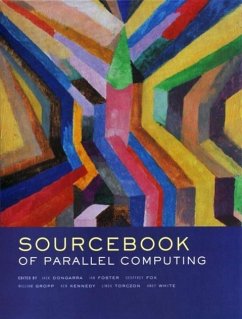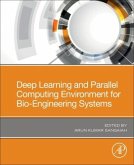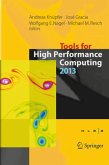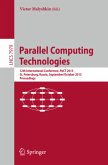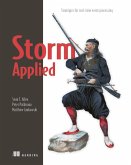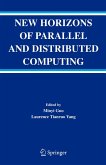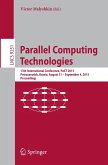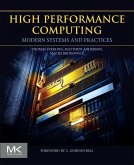The Sourcebook of Parallel Computing
Herausgeber: Dongarra, Jack; White, Andy; Torczon, Linda; Kennedy, Ken; Gropp, William; Fox, Geoffrey C; Foster, Ian
The Sourcebook of Parallel Computing
Herausgeber: Dongarra, Jack; White, Andy; Torczon, Linda; Kennedy, Ken; Gropp, William; Fox, Geoffrey C; Foster, Ian
- Gebundenes Buch
- Merkliste
- Auf die Merkliste
- Bewerten Bewerten
- Teilen
- Produkt teilen
- Produkterinnerung
- Produkterinnerung
With the widespread introduction of small inexpensive shared-memory processor systems and clusters of PCs, more and more scientists and engineers and educational institutions can realistically consider buying and using parallel systems to solve problems They all need to learn how to program these systems efficiently. With over 60 contributors, The Sourcebook of Parallel Computing provides a broad overview to parallel computers and parallel computing by first examining the architecture of modern parallel computer systems and identifying key considerations for programming them. Through specific…mehr
![Deep Learning and Parallel Computing Environment for Bioengineering Systems Deep Learning and Parallel Computing Environment for Bioengineering Systems]() Deep Learning and Parallel Computing Environment for Bioengineering Systems104,99 €
Deep Learning and Parallel Computing Environment for Bioengineering Systems104,99 €![Tools for High Performance Computing 2013 Tools for High Performance Computing 2013]() Tools for High Performance Computing 201374,99 €
Tools for High Performance Computing 201374,99 €![Parallel Computing Technologies Parallel Computing Technologies]() Parallel Computing Technologies37,99 €
Parallel Computing Technologies37,99 €![Storm Applied: Strategies for Real-Time Event Processing Storm Applied: Strategies for Real-Time Event Processing]() Sean T. AllenStorm Applied: Strategies for Real-Time Event Processing27,99 €
Sean T. AllenStorm Applied: Strategies for Real-Time Event Processing27,99 €![New Horizons of Parallel and Distributed Computing New Horizons of Parallel and Distributed Computing]() Minyi Guo / Laurence Tianruo YangNew Horizons of Parallel and Distributed Computing182,99 €
Minyi Guo / Laurence Tianruo YangNew Horizons of Parallel and Distributed Computing182,99 €![Parallel Computing Technologies Parallel Computing Technologies]() Parallel Computing Technologies37,99 €
Parallel Computing Technologies37,99 €![High Performance Computing High Performance Computing]() Thomas SterlingHigh Performance Computing113,99 €
Thomas SterlingHigh Performance Computing113,99 €-
-
-
- Produktdetails
- Verlag: Elsevier Science
- Seitenzahl: 864
- Erscheinungstermin: 11. November 2002
- Englisch
- Abmessung: 242mm x 195mm x 45mm
- Gewicht: 1574g
- ISBN-13: 9781558608719
- ISBN-10: 1558608710
- Artikelnr.: 21900747
- Verlag: Elsevier Science
- Seitenzahl: 864
- Erscheinungstermin: 11. November 2002
- Englisch
- Abmessung: 242mm x 195mm x 45mm
- Gewicht: 1574g
- ISBN-13: 9781558608719
- ISBN-10: 1558608710
- Artikelnr.: 21900747
Ian Foster is Senior Scientist in the Mathematics and Computer Science Division at Argonne National Laboratory, where he also leads the Distributed Systems Laboratory, and Associate Professor of Computer Science at the University of Chicago. His research concerns techniques, tools, and algorithms for high-performance distributed computing, parallel computing, and computational science. Foster led the research and development of software for the I-WAY wide-area distributed computing experiment, which connected supercomputers, databases, and other high-end resources at 17 sites across North America (a live experiment at the Supercomputing conference of 1995).
Geoffrey Fox is Professor of Computer Science, Informatics, and Physics at Indiana University, where he is also the Director of the Grid. He is currently focussing on earthquake science, and GRID technology to build electronic communities linking resources and people.
William Gropp is a senior computer scientist and associate director of the Mathematics and Computer Science Division at Argonne National Lab. He is also a senior scientist in the Computer Science department at the University of Chicago and a senior fellow in the Argonne-University of Chicago Computation Institute. His research interests are in parallel computing, software for scientific computing, and numerical methods for partial differential equations. He has played a major role in the development of the MPI message-passing standard.
p
Ken Kennedy is the Ann and John Doerr Professor of Computational Engineering and Director of the Center for High Performance Software Research (HiPerSoft) at Rice University. He is a fellow of the Institute of Electrical and Electronics Engineers, the Association for Computing Machinery, and the American Association for the Advancement of Science and has been a member of the National Academy of Engineering since 1990. From 1997 to 1999, he served as cochair of the President's Information Technology Advisory Committee (PITAC). For his leadership in producing the PITAC report on funding of information technology research, he received the Computing Research Association Distinguished Service Award (1999) and the RCI Seymour Cray HPCC Industry Recognition Award (1999).
Professor Kennedy has published over 150 technical articles and supervised 34 Ph.D. dissertations on programming support software for high-performance computer systems. In recognition of his contributions to software for high-performance computation, he received the 1995 W. Wallace McDowell Award, the highest research award of the IEEE Computer Society. In 1999, he was named the third recipient of the ACM SIGPLAN Programming Languages Achievement Award.
Linda Torczon is a principal investigator on the Massively Scalar Compiler Project at Rice University, and the Grid Application Development Software Project sponsored by the next Generation Software program of the National Science Foundation. She also serves as the executive director of HiPerSoft and of the Los Alamos Computer Science Institute. Her research interests include code generation, interprocedural dataflow analysis and optimization, and programming environments.
Andy White is the Special Projects Director for the Weapons Physics Directorate at Los Alamos National Laboratory. This newLab oratory enterprise focuses on research issues in computer and computational sciences
associated with employing the largest, most complex computational resources to address important national issues such as stockpile stewardship, energy and environment,
systems biology, nanotechnology and crisis management.
1. Introduction
2. Parallel Computer Architectures
3. Parallel Programming Considerations
II. Applications
4. General Application Issues
5. Parallel Computing in CFD
6. Parallel Computing in Environment and Energy
7. Parallel Computational Chemistry
8. Application Overviews
III. Software technologies
9. Software Technologies
10. Message Passing and Threads
11. Parallel I/O
12. Languages and Compilers
13. Parallel Object-Oriented Libraries
14. Problem-Solving Environments
15. Tools for Performance Tuning and Debugging
16. The 2-D Poisson Problem
IV. Enabling Technologies and Algorithms
17. Reusable Software and Algorithms
18. Graph Partitioning for Scientific Simulations
19. Mesh Generation
20. Templates and Numerical Linear Algebra
21. Software for the Scalable Solutions of PDEs
22. Parallel Continuous Optimization
23. Path Following in Scientific Computing
24. Automatic Differentiation
V. Conclusion
25. Wrap-up and Features
1. Introduction
2. Parallel Computer Architectures
3. Parallel Programming Considerations
II. Applications
4. General Application Issues
5. Parallel Computing in CFD
6. Parallel Computing in Environment and Energy
7. Parallel Computational Chemistry
8. Application Overviews
III. Software technologies
9. Software Technologies
10. Message Passing and Threads
11. Parallel I/O
12. Languages and Compilers
13. Parallel Object-Oriented Libraries
14. Problem-Solving Environments
15. Tools for Performance Tuning and Debugging
16. The 2-D Poisson Problem
IV. Enabling Technologies and Algorithms
17. Reusable Software and Algorithms
18. Graph Partitioning for Scientific Simulations
19. Mesh Generation
20. Templates and Numerical Linear Algebra
21. Software for the Scalable Solutions of PDEs
22. Parallel Continuous Optimization
23. Path Following in Scientific Computing
24. Automatic Differentiation
V. Conclusion
25. Wrap-up and Features

